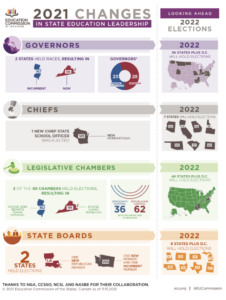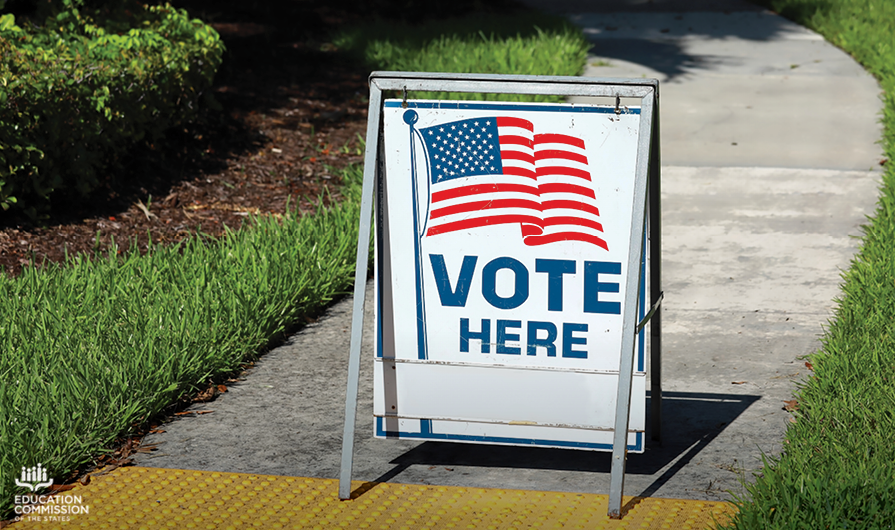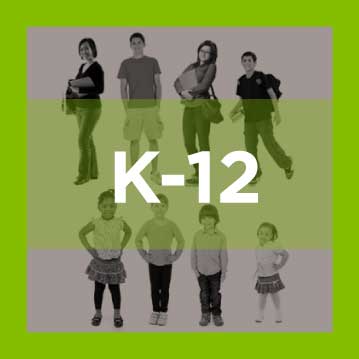In this off-cycle year, few changes in education leadership were expected ahead of the Nov. 2 vote. However, results in the handful of states that held elections may shed light on what we can expect looking ahead to the significant number of state elections that will be held in 2022. Our 2021 elections infographic provides a breakdown of the results, as well as a preview of what we’ll see next year.
Governors
Two states held gubernatorial races this year — Virginia and New Jersey.
In Virginia, incumbent Gov. Ralph Northam (D) could not run for reelection. Education was one of the focal points of the campaign and ultimately, Glenn Youngkin (R) defeated former Gov. Terry McAuliffe (D) in the general election.
In New Jersey, incumbent Gov. Phil Murphy (D) faced challenger Jack Ciattarelli (R) and was ahead in the polls going into Tuesday’s election. Gov. Murphy secured a second term as New Jersey’s top state leader.
These results change the partisan split of the nation’s governors to 28 Republican and 23 Democrat, including the District of Columbia's mayor.
State Education Chiefs
As covered in our preelection blog post, Wisconsin was the only state to hold an election for a state education chief. With the nonpartisan general election back in April, Jill Underly became Wisconsin’s newest state superintendent of public instruction.
Newly elected Gov. Glenn Youngkin in Virginia will have the authority to appoint a new state superintendent of public instruction. Angelica Allen-McMillan is the current acting commissioner of education under newly reelected Gov. Murphy (NJ). She is awaiting consent of the state senate.
State Board of Education
Louisiana was the only state to hold a state board of education election earlier this year and chose new member Michael Melerine (R) to serve in the position. State board of education members are appointed by the governor in Virginia, so there is an opportunity for leadership changes at the state board level as well. In addition, Washington held elections for their state board of education via electors, resulting in one new member and one incumbent member.
State Legislators
This year, three of the 99 legislative chambers held elections for seats in two states — the New Jersey House of Representatives and State Senate, along with the Virginia House of Delegates. Republicans gained seats in all three chambers. In fact, Republicans gained enough seats in the Virginia House of Delegates to take back the majority. Virginia will now join Minnesota as the only states to have split party control of the legislature.
Ballot Measures
In addition to leadership changes, Education Commission of the States identified three states with education-related measures on the 2021 ballot, with two measures failing.
- Colorado Initiative 25, on the ballot as Proposition 119, would have increased marijuana retail sales tax to partially fund the creation of an out-of-school education program for children ages 5 to 17 years old and to fund an independent state agency to govern the program.
- New Jersey Public Question 1 would have changed state law to permit wagering, through casinos and current or former horse racetracks, on all college sports or athletic events.
Washington enacted S.B. 5096 in 2021 to increase taxes on capital gains to fund education and child care programs. Advisory Vote Number 37, which has no binding authority and serves in an advisory capacity only, shows public support for repealing the capital gains tax increase.
Looking Ahead to 2022
Similar to the 2018 elections, 2022 is guaranteed to bring numerous changes to the education leadership landscape — including 36 gubernatorial races. Unlike 2018, there are more incumbent governors that will be running for re-election next year, with at least 26 already stating their intent to seek another term.
We'll also see elections for other major players in education policy — with seven state education chiefs and seats on the state board of education in eight states plus the District of Columbia on the ballot. Last, but not least, 46 states plus the District of Columbia will hold legislative races, which will most certainly result in changes to state education committee chair seats and membership. As always, our team will keep you up to date as those races get underway, and we look forward to seeing you next year!
















